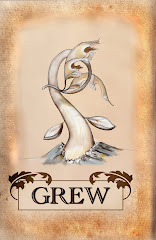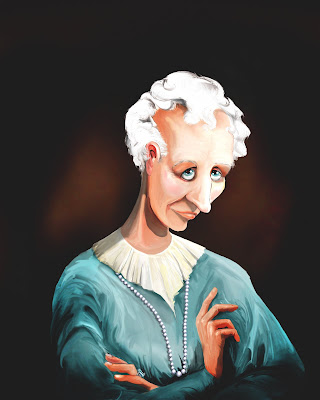Should an artist concentrate on entertaining,
or should they strive to inform, to enlighten, to
move an audience in some way?
move an audience in some way?
Art, to which I am personally drawn, must have some
meaning, Some moral good or ethical truth that motivates
and inspires me to better myself.
meaning, Some moral good or ethical truth that motivates
and inspires me to better myself.
We are always encouraged to speak from our hearts,
to pull from our own personal experiences.
Risky business.
We all know the sting of an open heart, slapped by
the palm of indifference or rejection.
Charlotte
Meet a new character from GREW.
Her name is Charlotte, inspired by a literal Charlotte, Charlotte Gerson of the Gerson Institute. Charlotte's selfless efforts in promoting the work of her father Max Gerson in the face of ardent opposition by the modern medical community are, (in my opinion) an artistic expression in the truest sense. A Beautiful Truth, Perhaps not with brush, paint, pen or ink, but with nutrition. With fresh, raw, organically grown produce and vegetable juices. With a vegan diet free from food additives, artificial colorings and preservatives. Things with which the Food Industry continues to envenom the public and which the American Food & Drug Administration continue to claim to be safe and non toxic. This in spite of the mounting evidence to the contrary.
What dose all this have to do with GREW?
We are integrally tied to our environment. It is an extension of our very being, not a place where we live. The importance of our paying attention to what we eat, to what we drink, and to the air we breathe can not be avoided or ignored. GREW will explore a world which has all but eliminated it's natural environment, replacing it with a panoply of man made marvels to "improve" upon what fools in their ignorance have eradicated from the earth. More importantly, it will shed light on the ability of the environment to cleanse itself from such cancerous incursions. Like the human body, freed from toxic impediments, which can dissolve a malignant tumor.









If you've move, informed or enlightened someone through your art, you have also entertained them. Whatever the priority for you may be, let your art-making come from the authentic part of you, and your audience will connect with it and with you:) Good work, Sam.
ReplyDeleteI think a good artist should strive to both entertain AND enlighten. It depends on the piece and/or the project. (Good) entertainment is really just another way to move somebody. When a story helps my imagination soar or brings a smile to my face, or a song fills my soul with joy or sorrow, the artist has touched me. It doesn't necessarily have to be a deep or profound new idea...entertaining work often speaks to a universally shared set of experiences. The good stuff can still touch us on an individual level, though.
ReplyDeleteOn the flip side, I believe the arts are the most effective way to deliver new ideas and inspire positive change in society.
It is ultimately up to the artist to decide if a project is intended to be strictly entertainment, enlightenment, or a combination of the two. The audiences' interpretation, of course, is a whole other matter :)
Cool direction with Grew. Sounds interesting.
Thanks for your comments Cyn & Denver! I love the way you guys think. For some reason I seem to work both ends of the spectrum intandem, my Kids book for awhile, then GREW. A little nonsense now and then you know. The difficult part is keeping the weighty er things entertaining. So easy to fall into the trap of infomercials and over zealous lecturing. I hope I can pull it off.
ReplyDeleteI agree with the comments above. The best stories do both.
ReplyDeleteThe DRAMATICA theory of story puts forth the proposition that all stories are arguments in order to make a point. The theory actually goes so far as to make a distinction between a "tale" and a "story". According to the DRAMATICA theory, tales are one sided moral arguments (ie.doing this is bad, because of so and so, the end). Stories, on the other hand, have well rounded argument from BOTH points of view but show why one view point trumps another. Both sides of the argument is presented in it's best possible form in order to truly be satisfying and in order to have a complete story.
In a way, the theory is basically saying that a story is like reading an entertaining version of THE SUMMA THEOLOGICA by Thomas Aquinas.
Usually, when a story feels preachy, it's because a good opposing argument was never presented.
Link to the theory below:
http://www.dramatica.com/theory/theory_book/dtb.html
Hey thanks for the insightful comment and link Luis.
ReplyDelete